Early Detection Key to Combating Oral Cancer, Says Kidwai Memorial Institute Expert
Ballari, Karnataka – August 10, 2025: Oral cancer can be curable if detected early, but delayed diagnosis continues to push patients into advanced stages of the disease, warned Dr. Nadimul Hoda, Head of the Department of Oral Oncology at Kidwai Memorial Institute of Oncology, Bengaluru. Speaking at a Continuing Dental Education (CDE) program organised by the Indian Dental Association (IDA) Ballari Branch at Pola Paradise, Ballari, Dr. Hoda underscored the critical role of dentists in early detection and timely referral of suspected cases.
“A majority of oral cancer patients in India present themselves at Stage 3 or 4, largely due to ignorance and delayed diagnosis,” Dr. Hoda said. “If dentists identify and refer cases at an early stage, patients can receive timely treatment, significantly improving outcomes.”
Dentists as the First Line of Defense
Highlighting the profession’s responsibility, Dr. Hoda urged dental practitioners to be vigilant during routine check-ups.
“The dentist is often the first healthcare professional to notice suspicious lesions or growths in the oral cavity,” he noted. “Early referral to a cancer centre can mean the difference between life and death.”
Tobacco Use and Rising Youth Vulnerability
Dr. Hoda pointed to tobacco in all its forms—chewing tobacco, gutka, pan masala, and smoking—as the leading cause of oral cancers in India. The tongue, he warned, is among the most dangerous sites for malignancies due to its aggressive nature and higher risk of metastasis.
“What is alarming is the growing number of young people developing oral cancer due to easy access to gutka, pan parag, and cigarettes,” he said. “We must prioritise community awareness on the harmful effects of tobacco, particularly among the youth.”
Holistic Approach to Cancer Care
Beyond medical intervention, Dr. Hoda called for compassion and commitment in treating cancer patients.
“A cancer surgeon should be passionate about their work and adopt a holistic approach—treating not just the disease, but the patient as a whole,” he emphasised. “Cancer is not a death sentence; it is curable if caught early.”
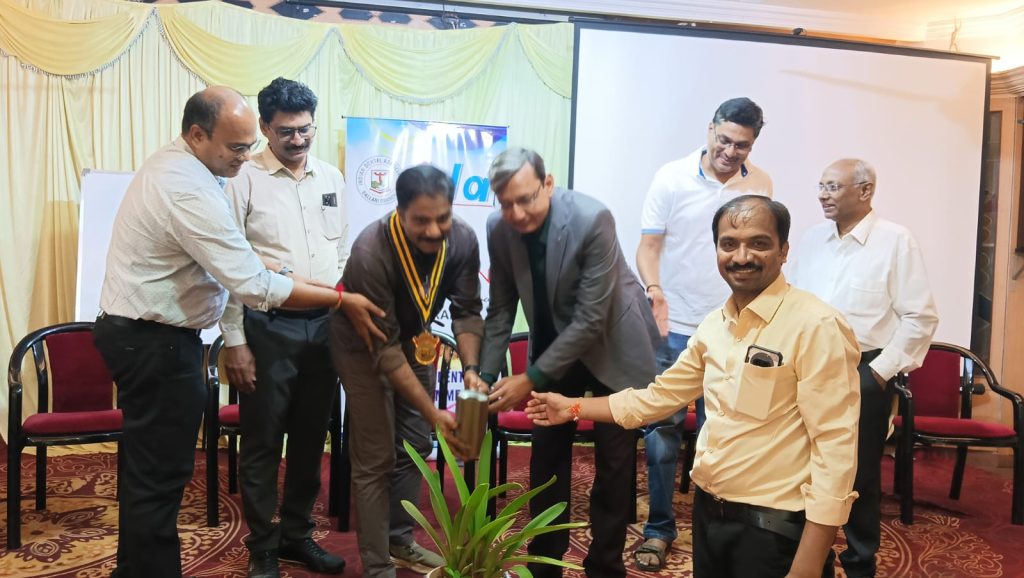
Dr. V.V. Jalli, Associate Professor, Department of Oral Medicine at FDCR & I, Ballari, delivered an insightful address on the early diagnosis and clinical presentation of oral cancer. He emphasised the importance of recognising subtle mucosal changes—such as non-healing ulcers, leukoplakia, erythroplakia, and indurated lesions—which often precede malignancy. Dr. Jalli highlighted that prompt identification of these lesions through thorough oral examinations, supported by diagnostic adjuncts like toluidine blue staining and biopsy, can significantly improve prognosis. He noted that understanding site-specific patterns, lesion morphology, and patient risk factors such as tobacco and alcohol use is essential for timely intervention and effective management.
Program Highlights
The CDE session, attended by dental surgeons from Ballari, featured prominent members of the IDA Ballari Branch, including:
- Dr Srinivas Reddy, President, IDA Ballari
-
Dr. Shridhar Reddy, Secretary
-
Dr. Yugandhar, CDE Convenor
-
Dr. Rajeev, Treasurer
-
Dr. Madhusudan, Past President
-
Senior practitioners Dr. Diwakar and Dr. Veera Reddy
The event aimed to strengthen the knowledge and skills of dental professionals in identifying early warning signs of oral cancer and promoting preventive strategies within their communities.
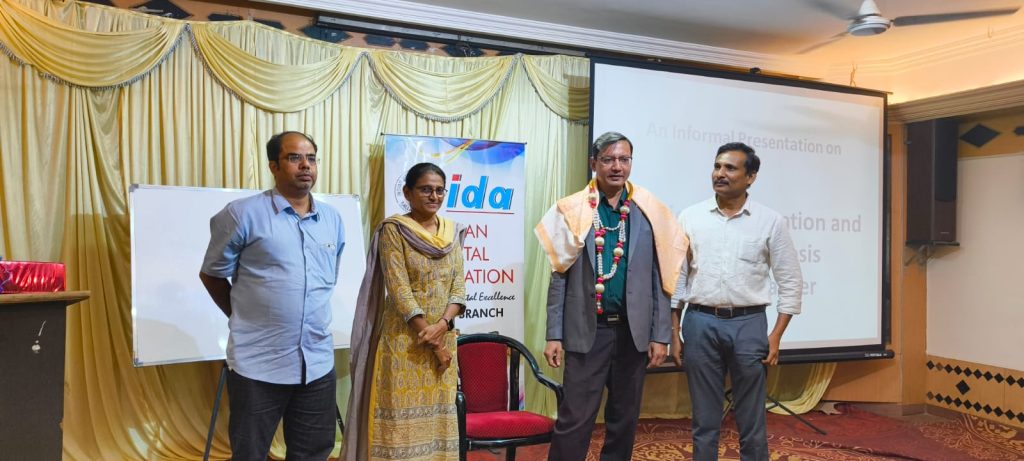
Background: The Oral Cancer Burden in India
According to recent medical statistics, India accounts for nearly one-third of the world’s oral cancer cases. Tobacco consumption remains the primary cause, with a substantial proportion of cases being preventable through lifestyle changes and early detection. Public health experts continue to stress the need for targeted awareness campaigns, stricter regulation on tobacco sales, and greater collaboration between primary dental care providers and oncology centres.
Media Updates: +91-93531 21474 [WhatsApp]
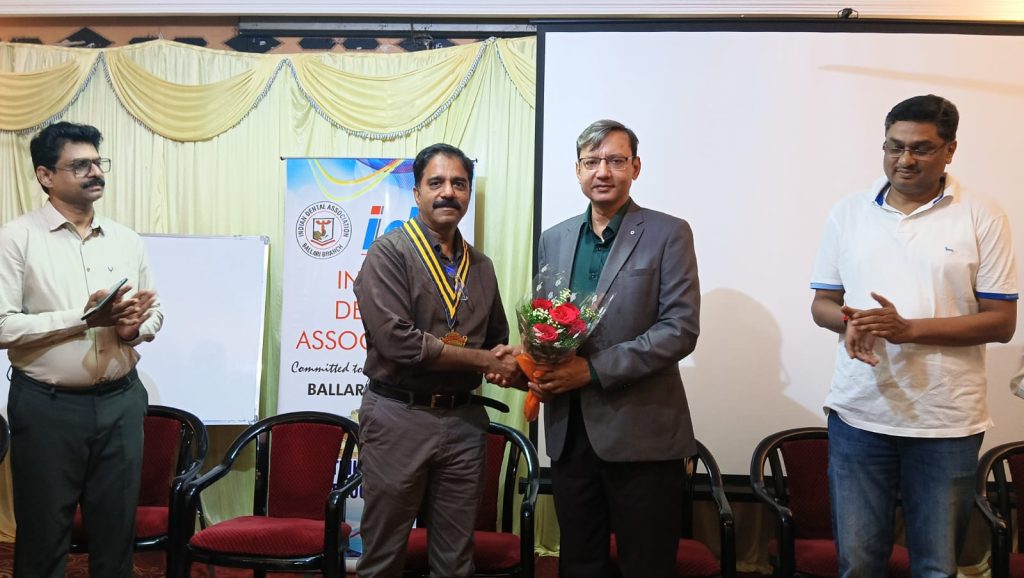
Conclusion:
As oral cancer rates rise—especially among younger populations—experts like Dr. Nadimul Hoda are calling for a proactive, community-based approach. With dentists positioned as the first point of contact, their vigilance and timely action could dramatically improve survival rates.
Key Quotes:
-
“A majority of oral cancer patients in India present themselves at Stage 3 or 4, largely due to ignorance and delayed diagnosis.” — Dr. Nadimul Hoda
-
“Dentists are the first line of defense. Early referral can mean the difference between life and death.” — Dr. Nadimul Hoda
-
“Tobacco in any form—chewing, smoking, gutka, or pan masala—is the leading cause of oral cancer in India.” — Dr. Nadimul Hoda
-
“We must prioritise community awareness on the harmful effects of tobacco, especially among the youth.” — Dr. Nadimul Hoda
-
“A cancer surgeon should treat not just the disease, but the patient as a whole.” — Dr. Nadimul Hoda
-
“Cancer is curable if caught early.” — Dr. Nadimul Hoda
Q&A: Fighting Oral Cancer – Insights from Dr. Nadimul Hoda
Head, Department of Oral Oncology, Kidwai Memorial Institute of Oncology, Bengaluru
Q: Why is early detection of oral cancer so important?
Dr. Hoda: A majority of oral cancer patients in India come to us in Stage 3 or 4. At these stages, treatment becomes more complex, outcomes are less favourable, and recovery is harder. If we detect the disease early—at Stage 1 or 2—treatment is simpler, recovery rates are much higher, and in many cases, we can completely cure the cancer.
Q: What role do dentists play in the fight against oral cancer?
Dr. Hoda: Dentists are often the first healthcare professionals to see the inside of a patient’s mouth. This gives them a unique opportunity to detect early signs of oral cancer—such as persistent ulcers, patches, or lumps—during routine check-ups. If dentists act quickly and refer suspicious cases to a cancer centre, they can save countless lives.
Q: What are the most common causes of oral cancer in India?
Dr. Hoda: Tobacco in all forms—smoking, chewing, gutka, pan masala—is the primary cause. Alcohol consumption also increases risk, especially when combined with tobacco use. Poor oral hygiene, chronic irritation from sharp teeth or ill-fitting dentures, and certain viral infections like HPV can also contribute.
Q: You mentioned the tongue as a particularly dangerous site. Why?
Dr. Hoda: Tongue cancers tend to grow and spread quickly to other parts of the body, including the lymph nodes. This aggressive nature makes early diagnosis even more critical. Unfortunately, many patients ignore symptoms like a persistent sore or pain on the tongue until it’s too late.
Q: Are you seeing more young people affected?
Dr. Hoda: Sadly, yes. We’re seeing a worrying rise in oral cancer cases among people in their 20s and 30s, largely due to gutka, pan parag, and smoking. These products are cheap, addictive, and aggressively marketed, making them dangerously accessible to young people.
Q: Apart from medical treatment, what approach should cancer care involve?
Dr. Hoda: Cancer treatment is not just about removing tumours or giving chemotherapy. It requires a holistic approach—emotional support, nutritional counselling, rehabilitation, and patient education. A good cancer surgeon treats the person, not just the disease.
Q: Is oral cancer curable?
Dr. Hoda: Absolutely—if it is detected early. With modern surgical techniques, targeted therapies, and rehabilitation support, patients can return to a normal life. But prevention and early detection remain the best weapons.
![]()


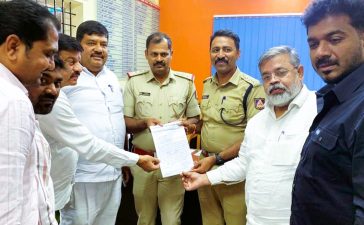
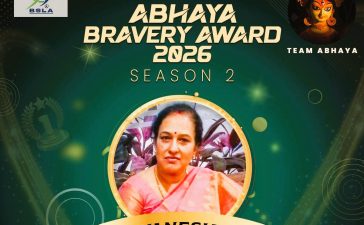








lmj7d5
tibc37